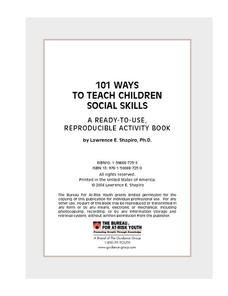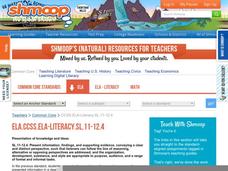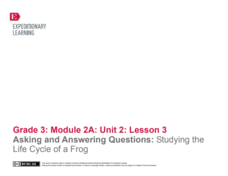Guidance Group
101 Ways to Teach Children Social Skills
Increasing pressure to improve student achievement has made it easy to overlook the social skills they also need to develop. With this collection of worksheets and activities, you'll be able to improve children's communication, teamwork,...
Teaching Children Philosophy
Tiger-Tiger, is it True?
Scholars take part in a philosophical discussion about truth, thoughts, and feelings following a reading of Tiger-Tiger is it True? by Byron Katie and Hans Wilhelm.
Missouri Department of Elementary
Ingredients of a Relationship Recipe
An eye-catching hook makes a smart analogy between ingredients for a food recipe and ingredients for quality relationships. Scholars discuss and list qualities they feel contribute to positive interactions. Pupils create a recipe card...
Missouri Department of Elementary
Don’t Tease Me!
A whole-class discussion sheds light on school bullying and ways to prevent it. Scholars share a moment when they observed or experienced some sort of teasing. Pupils brainstorm ways such behavior can be stopped or prevented.
PBS
Organizing the Farm Worker Movement
The food on young scholars' tables was likely harvested by hands that fought for fair wages and working conditions. By examining the life of Cesar Chavez and Dolores Huerta, learners connect their daily meals with the struggles of those...
British Council
Dictionary Skills for Secondary Students
Pop quiz! Learners work in groups to answer questions on a quiz about dictionary skills. They then work to create a dictionary skill quiz of their own. Groups exchange quizzes and race to find all of the answers.
Shmoop
ELA.CCSS.ELA-Literacy.SL.11-12.4
Study allusions with a research and presentation project. Pupils are assigned a specific allusion, the phoenix for example. They research the origins, compose a summary, explain the concept, and explore this allusion within various...
New York City Department of Education
Grade 3 Literacy: Investigating Sharks
Shark! Scholars read about sharks in Facts about Sharks by Susanna Batchelor. They then pretend they are shark scientists and choose a shark they want to study. Learners research their sharks and record information in graphic organizers...
Scholastic
Study Jams! Earthquakes
Have a seismic moment with your class as you show this animated video on earthquakes. Viewers find that quakes occur on faults and are caused by shifting of continental plates. They learn what properties are studied by seismologists and...
Scholastic
Study Jams! Distributive Property
The distributive property is a foundational skill taught two ways in this interactive web page. Your young mathematicians can practice their order of operations by solving distributive problems working from inside out. They then move on...
University of Houston
The Snow Queen Study Guide
Even the kindest friends can become selfish and tyrannical in Hans Christian Andersen's "The Snow Queen." Class members complete story-themed exercises in language arts, social studies, and even physical science.
EngageNY
Asking and Answering Questions: Studying the Life Cycle of a Frog
A lesson challenges learners to ask and answer questions about the life cycle of a frog. With a class read-aloud, partner discussion, and notebook reflections, scholars complete a three-page worksheet to prove their understanding of the...
EngageNY
Studying Conflicting Interpretations: Perspectives on Plessy v. Ferguson: Part 1
Scholars begin building background knowledge about Plessy v. Ferguson by watching a video about the landmark Supreme Court decision. They engage in discussions to analyze the case's importance and deepen their understanding of issues...
EngageNY
Informational Essay Planning: Studying the Essay Prompt and Gathering Evidence
Using a Gathering Evidence note-catcher, readers record evidence in A Mighty Long Way and Little Rock Girl 1957. They then use the evidence to analyze and discuss different mediums with their peers. Lastly, they look at a writing prompt...
Radford University
Statistical Study
Put your knowledge of sample surveys to good use. Pupils begin by conducting a survey of class members. They identify an appropriate topic and sampling technique; collect and organize their data; compute and analyze statistical measures;...
Scholastic
Study Jams! The Kingdoms of Life
Zoe and RJ discuss the way scientists classify organisms into five kingdoms. Characteristics of each group are highlighted within their conversation and with text. First-time taxonomists can view the animation at home, take the...
Scholastic
Study Jams! Equivalent Fractions
Submarine sandwiches not only taste good, they also make for great math models. Follow along as Zoe explains how to calculate equivalent fractions, while cutting up a sandwich for herself and her friend. She demonstrates the process...
Scholastic
Study Jams! Decimal & Fraction Equivalents
If a candy bar costs 3/4 of a dollar, can your mathematicians figure out the cost in cents? After watching this animated video, your learners will see that every fraction can be a decimal and every decimal can be a fraction. The video...
Scholastic
Study Jams! Estimate Sums & Differences of Whole Numbers
Estimating is an essential skill used in everyday life. This presentation explains how to apply prior knowledge about rounding numbers to estimating sums and differences. Example problems and assessment include large numbers, making this...
Scholastic
Study Jams! Add & Subtract with Unlike Denominators
Your bakers might not realize that they need to know how to add with unlike denominators in order to figure out how much milk they need for a recipe. In order to make brownies and cookies, this lesson teaches how to find a common...
Scholastic
Study Jams! Stem-and-Leaf Plots
Organizing data doesn't have to be boring when you introduce stem and leaf plots to the lesson. In a step-by-step interactive lesson, learners can see how to put data into one of these plots and easily see any patterns. Included are test...
Scholastic
Study Jams! Double-Line Graphs
With two summers of babysitting money, Mia needs a way to compare her earning from both years. Show your learners that they can organize the data onto a double-line graph to easily compare which summer was more profitable. The lesson...
Scholastic
Study Jams! Area of Irregular Figures
Painting an irregular figure can be tricky if we don't know the exact area. This interactive presentation reveals that irregular figures can be broken into smaller, simple figures that use the area formulas. Go through two examples,...
Scholastic
Study Jams! Histograms
With so many ways to organize data, a histogram is useful when we need to graph a variety of ranges. The interactive lesson plan organizes heights into different categories, not too big and not too small, to display on a histogram. The...
Other popular searches
- Authors Study
- Word Study
- Study Abroad
- Study Skills Curriculum
- Homework Help and Study Guides
- Case Study
- Study Habits
- Genre Study
- +Study +Abroad
- Feasibility Study
- Film Study
- Case Study on Brainstorming















